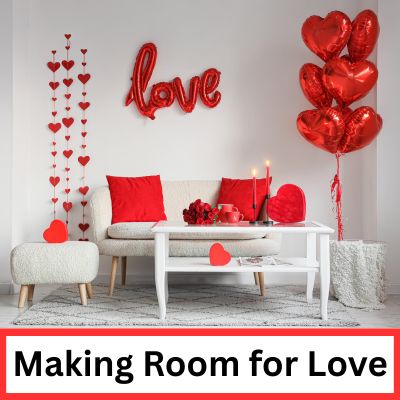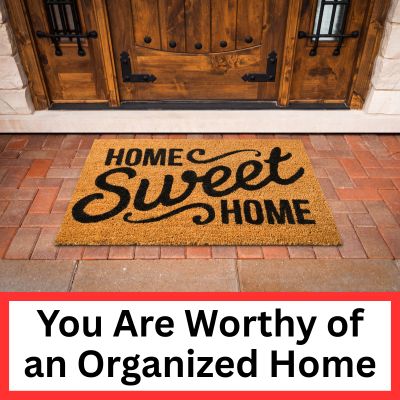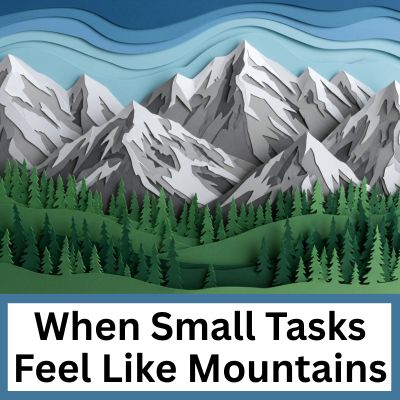Factors Associated with Disorganization, Part 1
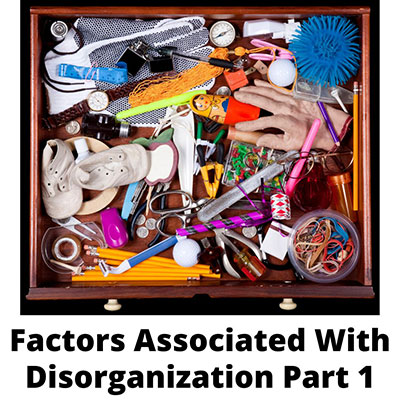
Disorganization comes in many different forms and is caused by many different factors. When you can determine why you are disorganized, you can take steps to break your pattern. In this post, I’ll list a variety of reasons why people are disorganized. Read this post to see if you can identify some of your root causes.
Neurologically-Based Conditions
ADHD is a neurologically based condition that can make it very difficult for people to get (or stay) organized. ADHD is almost synonymous with disorganization. I also help clients with traumatic brain injuries, fibromyalgia, Parkinson’s, and multiple sclerosis, which are other neurologically-based conditions. And although it’s not a neurologically-based condition, I wanted to add Hashimoto’s or other thyroid issues to this category. I will do a post specifically about thyroid issues soon since they are so common, and the symptoms overlap with ADHD.
Environmental Factors
Sometimes, poor lighting is the major contributing factor to disorganization. Light (or the lack of light) can direct/redirect clutter. Light can help motivate someone to declutter or keep things tidy. It also purifies a space. Whether it be adding more natural light or changing out the color or type of artificial bulbs, light can dramatically influence the level of clutter in a home. Does your home lack storage space? Maximize your furniture so that you can adequately store all you want to house. Do you have multiple homes? Switching from one house to the other (seasonally, or just traveling for work) can drain a lot of your energy and make it difficult to remember which things belong in which house. An awkward traffic flow in a home can also make stagnant areas where clutter accumulates. If your home is unpleasant (dingy, loud, ugly colors, broken appliances, too hot/cold, has an unpleasant odor, or whatever else makes it unpleasant) can make it really hard to feel motivated to keep things tidy. Or maybe you’re doing a house renovation, and everything has been turned upside-down. These are all good reasons why you’re disorganized.
Lack of Skills
Most people were never taught home organizing skills in school. Even I didn’t get to take Home Economics when I was in school due to the infrequency at which it was offered. If your parents weren’t good at keeping house, you didn’t see good modeling by your parents or guardians. If you were never taught how to organize your stuff, you may find yourself “churning” or just moving things from one pile to the next. People are just expected to know how to organize their stuff on their own, and unfortunately our society shames people who can’t keep their stuff together.
Choices
Are you over-scheduled? Do you choose too many things to keep in your home? Are you setting goals for yourself? Sometimes, when people don’t have anything better to do, or are afraid of their magnificence, they may waste their time and space on things that are insignificant to their long-term growth. Misplacing priorities is another trap. Are you saying something is a priority to you, but letting something else take priority? Take some time out to make sure your goals and actions are in alignment with your values.
Communication Problems
Do you have good negotiation skills? Do you have conflicting communication styles with other people in your life? How are you at communicating with yourself? When you are lacking communication skills with people in your life, it can cause a lot of stress and heartache. Do you have good leadership and delegation strategies? When you can effectively share chores with people in your household, everyone will be happier.
Systemic Factors
Do you have an organizing system? Or is the organizing system you have too complex or hard to implement? Does everyone in your house know what the system is? Is there tension brewing because not everyone is following the system? If you don’t have a system in place, it may be time to get one. Remember, using an organizing system is a habit, and building habits take time. But if what you’re trying to do is too tedious, it might be time to simplify your system.
Addictive Tendencies
Do you compulsively acquire things? Or do you have “infomania”, the compulsive desire to check or accumulate news and information? Are you addicted to urgency? Do you compulsively save things? Do you have a drug or alcohol addiction? Cell phone addiction? Addiction to a person (codependency)? Are you a workaholic? Addicted to exercise? Addicted to sugar? Addicted to diet soda? Addicted to TV/video games? ALL of these things can make it really hard to get organized and stay organized.
Mental Health Issues
All mental health issues can impact organization. Many people want to avoid dealing with their stuff because it may bring traumatic memories to the surface. Depression can make people not feel motivated to organize. It can also make people feel like they aren’t worthy of living in a neat and organized home. Compulsive hoarding disorder makes it really hard for people to let go of things. Anxiety disorder can make people feel really unsure of what they will need in the future. It can also make people nervous to let someone help them go through their stuff. Obsessive compulsive disorder makes it hard for people to get organized for many reasons, including intrusive thoughts and repetitive behaviors. Obsessive compulsive personality disorder may also make it hard for people to get organized since they are ruled by perfection.
Transitions
Have you had one or more moves within the past few years? Sometime relocation stress syndrome can last longer. Whether or not the move is desired, moving can bring on a lot of unwanted feelings such as loneliness, feeling ungrounded, feeling lost, feeling overwhelmed, and a general feeling of uneasiness. The birth or adoption of a child is a major life transition that can bring on disorganization, as can the death of a loved one. Divorce or separation is another major life transition that can take years to recover from organizationally.
Did any of these factors ring true for you? Next week I’ll do another post about even MORE factors associated with disorganization.
Source: ICD Fact Sheet 004
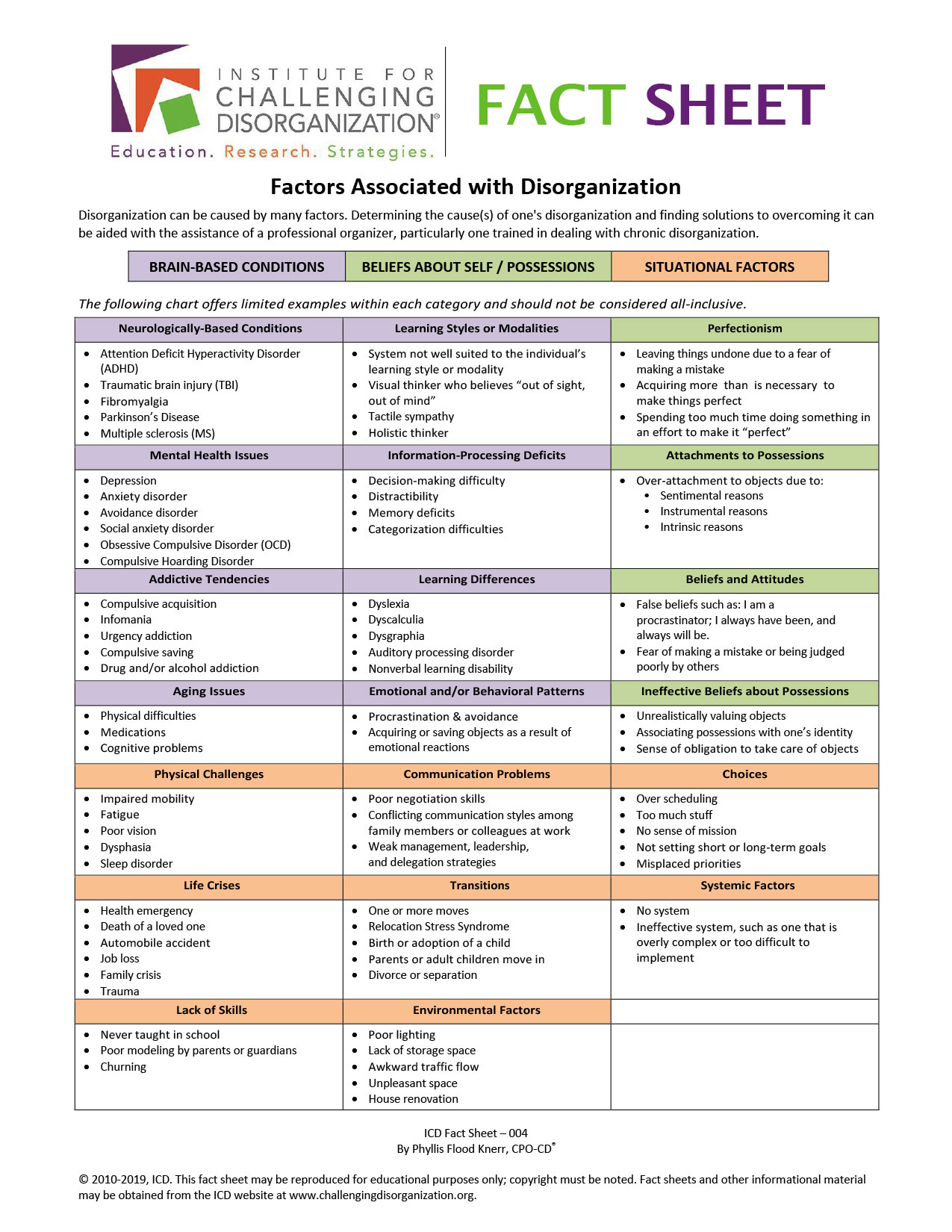

By Jean Prominski, Certified Professional Organizer
Don’t forget to sign up for my organizing classes here
Download my free 5 week journal The Seattle Sparkle Method to Get Organized and Stay Organized
Sign up for my free 4 Day Color to Declutter Challenge.
Become part of a like-minded community by joining my Facebook Group, Declutter and Organize with Seattle Sparkle.
Ready to book a consultation? Complete this form.
For artwork to energize your home, order through jeanprominski.com or on Etsy.


